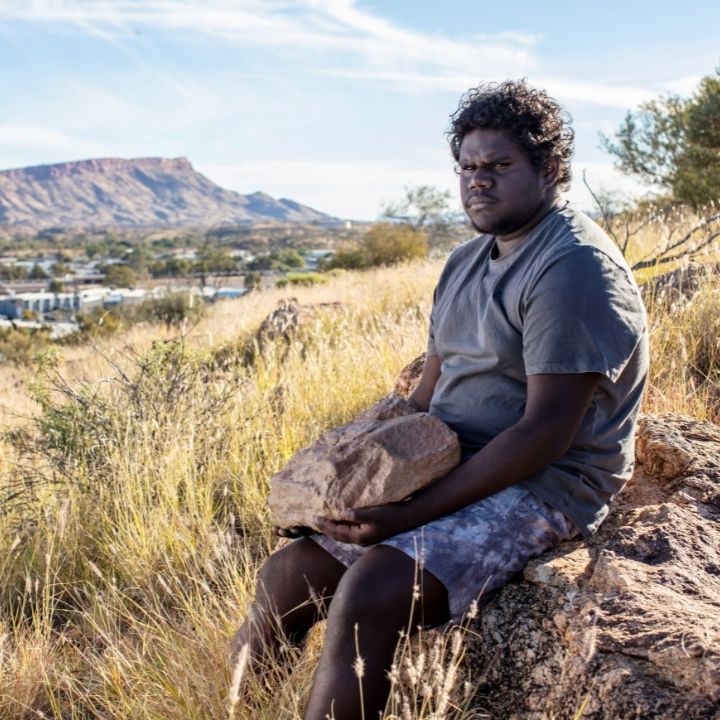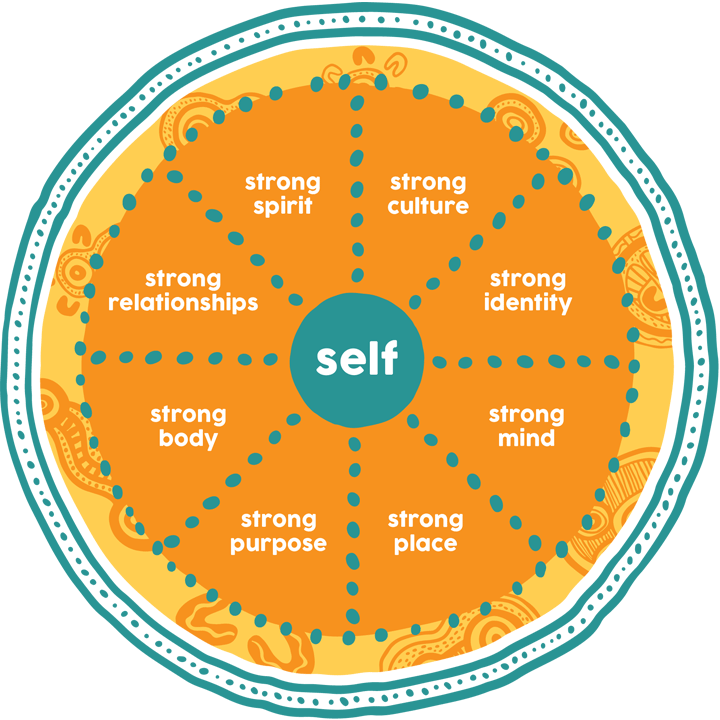Nobody is 100% all the time and that’s OK. When you are as strong and deadly in as many parts of your life as possible, then you’re a stronger you for you, your family, your friends and your community. There is nothing selfish about taking the time to care for yourself.
What might you notice?
Sometimes it can be hard to notice that we might not be feeling 100%. That is normal. Here are some signs to look out for that we might need to pay a little attention to our wellbeing.
If you’re not 100% you might notice:
- your mind feels stressed a lot of the time, tired for no reason, flat or sad, or maybe nervous
- your body feels heavy, tired or restless
- you're sleeping less or tired all the time
- you feel disconnected from loved ones
- you’re finding it hard to switch off from your phone and social media
- you're using alcohol and other drugs more
- changes in your work or study habits.
These might be impacting on your feelings of purpose, identity and connection to country, culture and spirit.
If you’ve noticed any of these, take some time to check out these tips to help your social and emotional wellbeing. You might try the Stronger You Wheel activity (PDF, 1MB).
What to do if you are having a tough time
Sometimes we might need a bit of extra support. Below are some suggestions that can help you look after your social and emotional wellbeing and build a stronger you.
- Recognise when you might need to look after your body.
- Some days it can feel tough and hard to move your body. On these days take a small step and see where it takes you. Often starting can be the hardest part.
- When we are feeling overwhelmed eating nutritious foods and drinking enough water might be hard. Try and eat some fresh foods and remember to drink plenty of water, this will help keep your body strong.
- Try to limit your use of alcohol and other drugs. They can be harmful / no good in the longer term.
- Learn more about your strong body.
- Recognising our cultures are the oldest ongoing cultures in the world has power.
- Explore the places, people and activities that make you feel deadly. Allow yourself to connect with these as much as possible.
- Learn more about your strong culture.
- When we are feeling a bit lost it can be important to sit somewhere quiet, close your eyes and allow yourself to dream about who you are.
- Learn more about your strong identity.
- Recognise when you might be going over and over things from the past or getting caught up worrying about the future.
- You can break this cycle by having a yarn with others.
- You might try some relaxation strategies to help keep your mind strong.
- Learn more about your strong mind.
- Connecting to your strong place can help you feel stable when things seem unsettled.
- Physically being on or in your strong place is one of the best things you can do to help you feel better.
- Getting back on country, returning to your hometown, even sitting in your room, if that is your safe place, can all be really helpful to your wellbeing.
- If your strong place is far away; think about how you might be able to re-create or reflect on your safe place wherever you are. Get creative and explore different ways to do this.
- Learn more about your strong place.
- Setting goals is a great way to start building a sense of purpose. Setting, striving for and achieving your goals means you are dreaming your future each day.
- Learn more about your strong purpose.
- Being respectful, kind, loving, and honest to others.
- Explore different ways of communicating to help your relationships.
- Learn more about your strong relationships.
- Celebrate that you are unique, beautiful and important. This can be hard to do. Start by making a note of the things you are grateful for each day. It doesn’t matter how small they might seem.
- Explore the places, people and activities that make you feel deadly. Allow yourself to connect with these as much as possible.
- Write about or draw the things you’re grateful for.
- Learn more about your strong spirit.
Discover the wellbeing wheel
This resource has been developed in partnership with the headspace Aboriginal and Torres Strait Islander Youth Reference Group (Womenjeka Reference Group), Marumali Consultations, the headspace National Aboriginal and Torres Strait Islander Advisory Group and headspace National.
The headspace Clinical Reference Group oversee and approve clinical resources made available on this website.
Last reviewed 1 July 2021.
Wellbeing wheel reference:
Gee, G., Dudgeon, P., Schultz, C., Hart, A, & Kerrie, K. (2014).Aboriginal and Torres Strait Islander Social and Emotional Wellbeing. In P. Dudgeon., H. Milroy, & R. Walker (Eds.), Working together: Aboriginal and Torres Strait Islander mental health and wellbeing principles and practice (2nd Ed.) (pp. 55-68). Canberra: Commonwealth of Australia.
Get professional support
If you feel you need help there are a range of ways we can support you.

